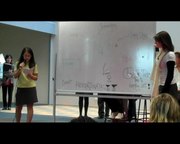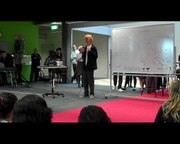How to be awesome in exams
Contents
Relaxation and dealing with stress. (Don't panic!)
- Start studying at least a week or two before the exam. It's been proven that cramming is generally not an effective study method, and it's a lot better if you give yourself time to familiarise yourself with the material. This will ensure you retain the most information.
- Take a break from the computer/books/study notes every now and then. Exeercise lets you relax, focus your thoughts better & clear your head. It's helpful if you take regular breaks while studying to avoid burnout.
- Get a good night's sleep before each exam :).
- Arrive early to the exam, so you're not feeling rushed and stressed. You can go through some study notes before you go into the exam.
- Another helpful tip in relaxation is to listen to classical music. Chuck on some Tchaikovsky, Mendelssohn, Mozart and/or Rachmaninoff and start studying until your heart is content. (I'd recommend Tchaikovsky's Nutcracker Suite, Rachmaninoff's Piano Concerto No. 2 Moderato, or Mendelssohn's Violin Concerto in E minor)
- take time to do other things as well. Plan when you will study so you not only will feel all knowledgeable and ready for the exams but won't be too thunk-outed
- don't make up words
Doing previous exam papers
This is really helpful when you're studying!
Print them off from the NZQA website.
Avoiding procrastination
I dont know about you but the one thing that gets in the way of me studying and doing homework is procrastination. 'just ten minutes' on facebook will turn into an hour, then suddenly it will be 10 o'clock at night and I'll have an essay due or a test the next day and I still wouldn't have done anything about it. If that sounds like you, then maybe some of these tips to fight procrastination could help you out.
One tip is to set yourself a time to complete something by. If you set a timer for ten minutes and say you'll work for ten straight minutes, even if you are not in the mood to do anything but comment on peoples status and join fan groups, nine times out of ten by the end of the ten minutes you'll be on a roll with your work, and will be far less likely to stray off task. Another way to keep time is to set tasks you need done at certain times. Like, lets say you have an essay due tomorrow, with an intro, conclusion and a few body paragraphs. If you set half an hour for each paragraph, by saying 'I'll have the intro done by half six, the first paragraph done by seven, the second paragraph done by half seven and so on, you can allow yourself time to go on facebook or text your mates, so long as you meet these deadlines. Considering most people work better under a bit of pressure, you're setting yourself smaller, less daunting deadlines to work for.
This brings me into my third tip: breaking up the job. By breaking down a task like an essay into little parts you're making the task seem alot smaller. If you do this with every big assignment or homework task by giving yourself small parts of each to get done every evening, you're psychologically making the task seem smaller. It also means you stay interested, if you have a little bit of a science research to do, and half a practice maths test, plus a few paragraphs of an english essay its alot more interesting than sitting down and writing a whole essay, or working through a massive amount of info for your research. As a procrastinator, your mind likes to move around and change subjects so by doing this with the work that you actually need to get done, you're keeping it amused.
The final countdown
Counting down to the exam. The months, days, and hours leading up to each exam.
Every year, NZQA has an exam countdown calendar on their website.
Making effective notes
- Use different colours to write your notes. This can help you remember the information better.
- Draw or print out small pictures that relate to key words you need to remember, this especially helps if you are a visual learner.
- Only use key information, don't write out pages and pages of information that areen't necessarily relevant.
- Write out information in your own words. This will help you remeber better because you are re-writing it and it will also make alot more sense.
- Use mind maps/bubble maps to display information in a different way.
- Create a timeline if you are trying to remember important dates for subjects such as history.
- Make flash cards to test yourself on key information, this way you can figure out what you need to learn and what you already know.
Using visual aids
What is a visual aid?
A visual aid when it comes to studying can be mind maps there are many different types of mind maps, however different mind maps can be better suited towards different study tasks. For example if your trying to plan an essay a tree map could be best so you can sort out what you will write for each body paragraph. However when trying to sort out study notes for subjects such like science bubble maps can be great too. It's all about what you find visually stimulating.
Setting and achieving goals
- MAKE A GOAL(S). just make sure it is realistic. Learn all *chemistry* things I need to know by 2nd week of the holidays is possible. To study 10 hours a day may not be.
What do you hope to achieve this year?
- If you gain 50 credits at Merit/Excellence your NCEA certificate is endorsed with Merit.
- If you gain 50 credits at Excellence your NCEA certificate is endorsed with Excellence.
- It's good to pass NCEA, but if you aim high and study hard to achieve it then you will reap greater rewards. Better marks means that you are open to more opportunities - in terms of universities, careers, events/conferences/positions that you can apply for.
- By going through all your external exams, you can work out which ones you are likely to get better grades in, which ones you need to work on, the most important ones...etc. You can decide on the expected grades for your exams.
Specific subjects
English
Written Texts
- Know your text inside-out!!! Reading through the text once or twice more helps to memorize the important aspects of the text.
- Make use of the Wikieducator pages to study the themes and characters.
- Most importantly write essays. Practice them. Become familiar with the variety of types of questions asked in the exams.
Visual Texts
- Watch through the movie a few times. This won't be hard. Once you get hold of the development of the plot, watch again and question yourself the director's motives in using certain camera shots, arrangement of sets, lighting, etc... Remember nothing in the film is unintentional.
- Think up annoyingly specific questions about the film and ask your peers to answer and vice-versa.
- Know the frequently terminology used and become fluent in using them.
- Practice essays.
Unfamiliar Texts
- Reading should be a daily effort.
- Trying to spot language techniques and analyzing their effects is a good way to practice for this standard. Have a go in doing this with any texts you can find such as magazines articles, news article, novels, etc...
- Familiarize yourself with the types of questions asked.
Level 1: http://www.nzqa.govt.nz/ncea/assessment/search.do?query=english&view=all&level=01
Level 2: http://www.nzqa.govt.nz/ncea/assessment/search.do?query=english&view=all&level=02
Languages
Listening
- Listen to podcasts and music
- Watch movies, TV shows and YouTube videos
- Make use of your language teacher and assistant teacher by speaking to them in that language. It will enhance both your listening and speaking skills.
Reading
- Read books, magazines, newspapers, online articles, and other publications
- Print off past exam papers for reading practice, and to get a feel for the types of themes and questions that are asked
- Learn a lot of vocabulary - relevant to the topics you have studied during the year, but also sentence starters, phrases to express opinion, and useful, general phrases.
Writing
- Print off past exam papers for writing practice, and to see what the general topics are
- Go through the topics you have studied throughout the year and write about them
- The Language Perfect website is a great resource to utilise, and it really improves your vocabulary. Make vocabulary lists (topic-specific, but also sentence starters and useful phrases).
www.languageperfect.co.nz/info/index.html
Subject Specific Resources (Spanish): www.nzqa.govt.nz/qualifications-standards/qualifications/ncea/ncea-subject-resources/spanish/level-1/
Commerce
Mathematics
[Put your information in here]
|

